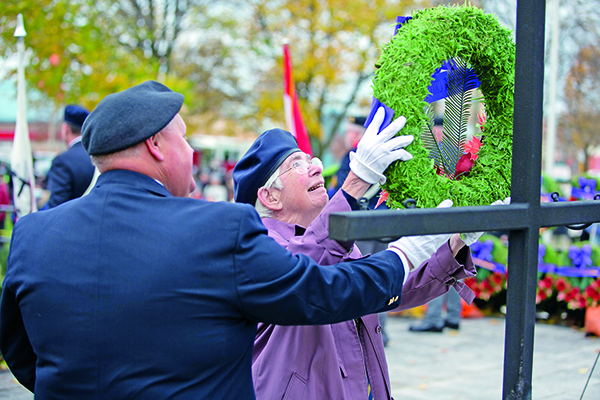General News » News
Eleanor Thomson was one of local Legion’s last Second World War veterans
July 27, 2023 · 0 Comments

Eleanor Thomson, a familiar face at the Aurora branch of the Royal Canadian Legion as one of its few surviving veterans of the Second World War, is being remembered for a life of service.
A teacher by vocation who served in the Canadian Army during the international conflict, Thomson died last week at the age of 97 after a brief illness.
Thomson, with her distinctive military cap, was a familiar face to Aurora residents at Remembrance services, including the annual parade to the Cenotaph where, in more recent years, she was among the last of the “Greatest Generation” able to regularly participate in the ceremonial and remind residents of the sacrifices made by her peers.
Finding herself in the stenograhic pool during the final days of the Second World War, Thomson did not see action on the frontlines; but, instead, the frontlines came to her when she was tasked with interviewing Commonwealth and American soldiers who survived Japanese Prisoner of War camps.
“The stories they told were not stories, they were the truth,” Thomson told The Auroran in 2013 of the harrowing tales she was tasked with transcribing. “They were all put in hospitals when they got back to gain back a bit of weight. You know how hospital gowns tie up in the back – this one man from England was sitting in a hospital bed while I wrote down his story. He leaned forward to get himself a cigarette from the side table and he had no buttocks, just bone sticking out and I nearly threw up on the spot. It was dreadful the treatment they received and you could see the results from some of them. The stories were pretty gruesome.”
Despite her efforts, and the efforts of thousands of women during this time, when life started to get back to normal, they found that their services were no longer required. Eleanor went on to a long career teaching elementary school, primarily in Grade Four, but the desire to serve never left.
When the Government opened up the doors to new recruits for the army reserves around 1952, she was more than eager to get back in, even if it was only for a couple of nights a week.
“Part of it is the camaraderie and part of it is we want to serve our country,” she said of her desire to continue her work with the Canadian Armed Forces, the Legion, and her home regiment – The Toronto Scottish Regiment (Queen Elizabeth the Queen Mother’s Own) – in particular. “I like doing things like the newsletter and keeping in touch with some of the old boys. There are a lot of fellas and girls I knew in that outfit and, just like anything else, you want to keep in touch.”
But, over the years, these “fellas and girls” became fewer and far between, with Thomson left as something of a torch-bearer.
As the years of the Second World War began to take their place in history, Thomson often looked on in wonder at women stepping up to join the Canadian Armed Forces of today.
She observed them being greeted as heroes, saluted for their bravery and commended for their patriotism for King, Queen and Country. Yet, when she found within herself a desire to serve at an early age, she received pushback from her mother.
She was not able to join the military until she had finished high school at the very least, she recalled of her maternal advice.
She initially wanted to be a radio operator, but was relegated to the steno pool when there were no available positions in her chosen field. As a woman, she was told she would be most useful as a clerk typist and a stenographer, so she did what she was told and had no regrets, stating that typing was always a useful skill to have at one’s disposal.
“Today, they let girls be in the army in full force, not just the reserves,” she said. “This is a welcome change. When I came in, all of our neighbours were in one of two camps, like the entire civilian population. Half of them said, ‘Oh, isn’t it wonderful, you’re so patriotic!’ but the other half said, ‘Ugh, no! Women in the army? That’s just disgusting.’ They were really snooty about it. Nowadays, they say, ‘Oh, you served in the army, aren’t you wonderful!’ Nobody turns up their noses now and it’s quite fascinating to watch.”
A life of change and a life well-lived.
By Brock Weir
Editor
Local Journalism Initiative Reporter











